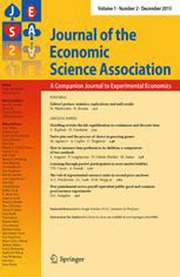Crossref Citations
This article has been cited by the following publications. This list is generated based on data provided by
Crossref.
Feige, Christian
2017.
Reference-Dependent Preferences in Stag-Hunt Coordination Games.
SSRN Electronic Journal ,
Rilke, Rainer Michael
2017.
On the duty to give (and not to take): An experiment on moralistic punishment.
Journal of Business Economics,
Vol. 87,
Issue. 9,
p.
1129.
Deffains, Bruno
Espinosa, Romain
and
Fluet, Claude-Denys
2017.
Laws and Norms: Experimental Evidence with Liability Rules.
SSRN Electronic Journal ,
Stoddard, Brock
2017.
Risk in payoff-equivalent appropriation and provision games.
Journal of Behavioral and Experimental Economics,
Vol. 69,
Issue. ,
p.
78.
Fernandes, Maria Eduarda
and
Valente, Marieta
2018.
When Is Green Too Rosy? Evidence from a Laboratory Market Experiment on Green Goods and Externalities.
Games,
Vol. 9,
Issue. 3,
p.
70.
Dariel, Aurélie
2018.
Conditional Cooperation and Framing Effects.
Games,
Vol. 9,
Issue. 2,
p.
37.
Feige, Christian
2018.
Other-Regarding Reference Points: A Matter of Perspective.
SSRN Electronic Journal ,
Cartwright, Edward
Stepanova, Anna
and
Xue, Lian
2019.
Impulse balance and framing effects in threshold public good games.
Journal of Public Economic Theory,
Vol. 21,
Issue. 5,
p.
903.
Ramalingam, Abhijit
Morales, Antonio J.
and
Walker, James M.
2019.
Peer punishment of acts of omission versus acts of commission in give and take social dilemmas.
Journal of Economic Behavior & Organization,
Vol. 164,
Issue. ,
p.
133.
De Geest, Lawrence R.
and
Stranlund, John K.
2019.
Defending public goods and common-pool resources.
Journal of Behavioral and Experimental Economics,
Vol. 79,
Issue. ,
p.
143.
Martinsson, Peter
Medhin, Haileselassie
and
Persson, Emil
2019.
MINIMUM LEVELS AND FRAMING IN PUBLIC GOOD PROVISION.
Economic Inquiry,
Vol. 57,
Issue. 3,
p.
1568.
Boun My, Kene
and
Ouvrard, Benjamin
2019.
Nudge and tax in an environmental public goods experiment: Does environmental sensitivity matter?.
Resource and Energy Economics,
Vol. 55,
Issue. ,
p.
24.
Gu, Ruolei
Liu, Jie
and
Cui, Fang
2019.
Pain and social decision-making: New insights from the social framing effect.
Brain Science Advances,
Vol. 5,
Issue. 4,
p.
221.
Cartwright, Edward
and
Ramalingam, Abhijit
2019.
Framing effects in public good games: Choices or externalities?.
Economics Letters,
Vol. 179,
Issue. ,
p.
42.
Muñoz‐Herrera, Manuel
and
Nikiforakis, Nikos
2019.
James Andreoni and the quest for others in our utility functions.
Journal of Public Economic Theory,
Vol. 21,
Issue. 5,
p.
804.
Bartke, Simon
Bosworth, Steven J.
Snower, Dennis J.
and
Chierchia, Gabriele
2019.
Motives and comprehension in a public goods game with induced emotions.
Theory and Decision,
Vol. 86,
Issue. 2,
p.
205.
Goerg, Sebastian J.
Rand, David
and
Walkowitz, Gari
2020.
Framing effects in the prisoner’s dilemma but not in the dictator game.
Journal of the Economic Science Association,
Vol. 6,
Issue. 1,
p.
1.
Pelligra, Vittorio
and
Vásquez, Alejandra
2020.
Empathy and socially responsible consumption: an experiment with the vote-with-the-wallet game.
Theory and Decision,
Vol. 89,
Issue. 4,
p.
383.
Ockenfels, Axel
and
Schier, Uta K.
2020.
Games as frames.
Journal of Economic Behavior & Organization,
Vol. 172,
Issue. ,
p.
97.
De Jaegher, Kris
2021.
COMMON‐ENEMY EFFECTS: MULTIDISCIPLINARY ANTECEDENTS AND ECONOMIC PERSPECTIVES.
Journal of Economic Surveys,
Vol. 35,
Issue. 1,
p.
3.


